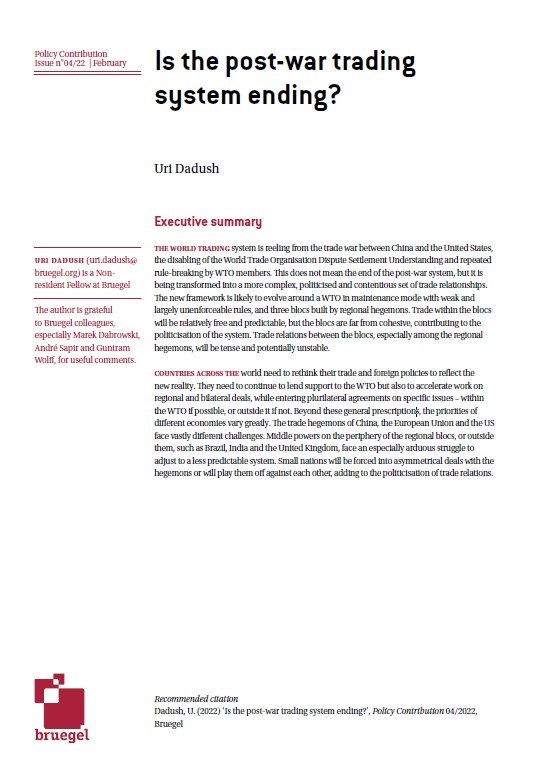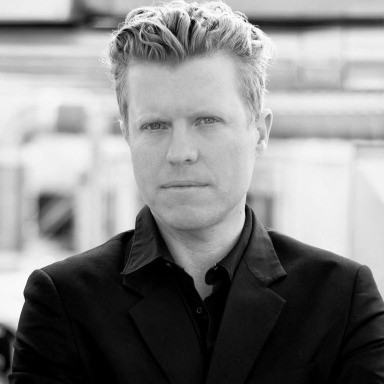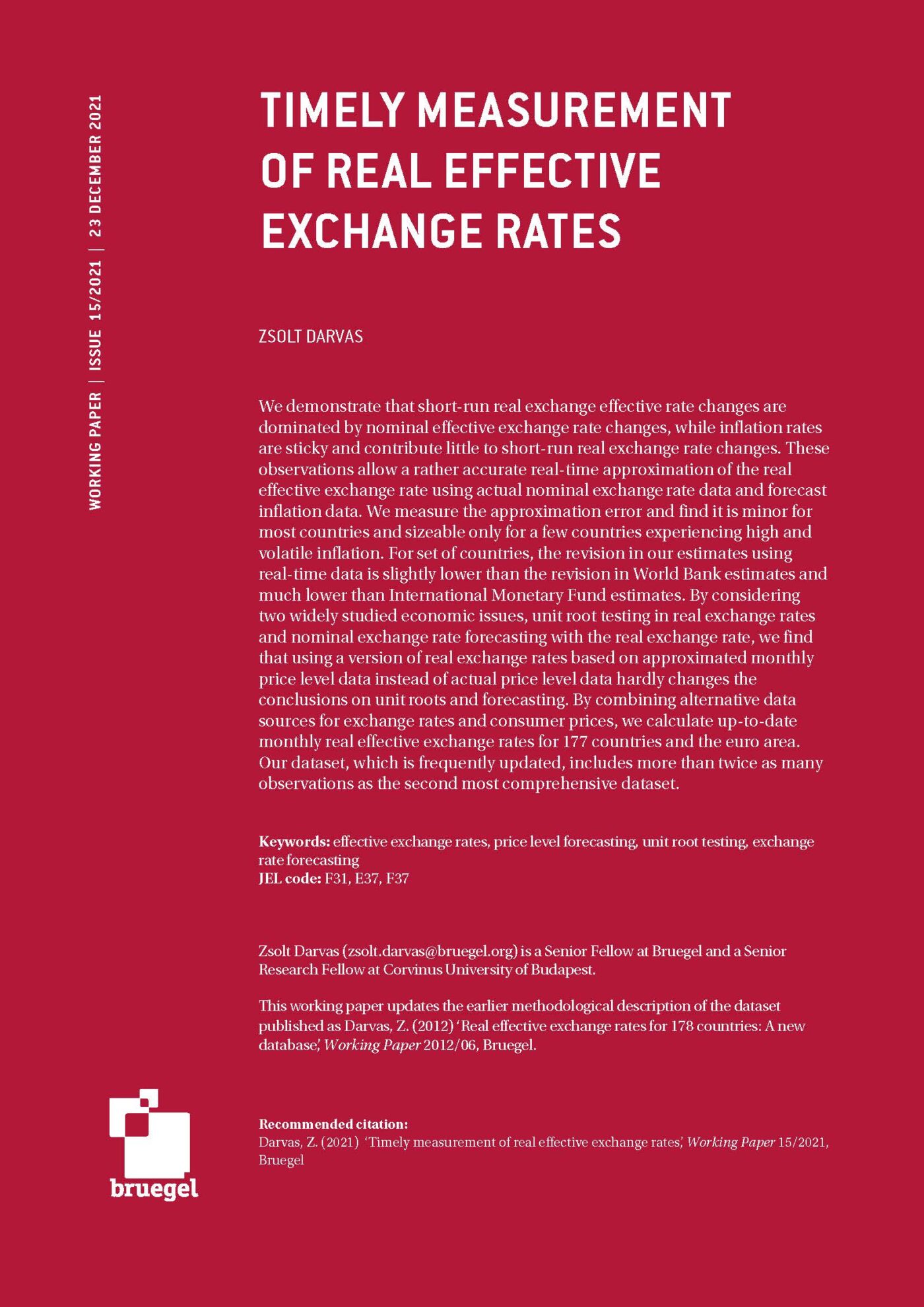Blog Post
Truths about Trade: A speech by Cecilia Malmström
Cecilia Malmström, European Commissioner for Trade, talks on the truths of EU trade at the Bruegel Annual Meetings 2019.
Ladies and gentlemen,
Today I want to discuss truth.
In the age we live in – of instant communication, simplified messages and government by Twitter – truth can be difficult to hold on to. There is a quote, attributed to Mark Twain: “A lie travels around the globe while the truth is putting on its shoes.” It is a famous quote, and very apt – especially given that there is no evidence that he said it.
Today, many in this room will agree on most things – but we will disagree on others. And in my experience, it is always good to find a mutual point to start on. So, let me suggest one: Ladies and Gentlemen – the earth is round. Or to be accurate: an oblate spheroid. Life would be easier if it were flat:
- cartographers could make maps more easily
- lunar eclipses would not ruin our view of the moon
- all of the stars in the sky would be perfectly visible every night
But unfortunately it is not flat – a fact first proved in the 3rd century BCE, when Hellenistic astronomy calculated its shape and circumference. Since then, the evidence has mounted up. From astronomical calculations to simple observation. From ground-level views to photos from aircraft and spacecraft.
So why, despite all of this evidence, does the International Flat Earth Research Society maintain a membership? Why is there a small, but active, online community? Because they follow instincts over evidence. When they look around them, they see a flat earth. I am afraid, however, that they are wrong. We sit here and we laugh about people believing the earth is flat, based on intuitive presumptions.Yet, these days many similar presumptions are made about trade – ones that feel intuitively true but are backed up by nothing of substance.
Often you hear people say that they are entitled to their opinion – That’s of course true, but even so, your beliefs should guide you, but not all decisions can be gut decisions. If you want to disagree with something, you have a responsibility to look at and understand the evidence. This is something that has become very clear to me in my time as Commissioner for Trade. I am a proud liberal – I believe in open borders and free trade. My ideological beliefs have guided me – but sometimes I must recognise the reality of a situation that is constantly evolving, even where I have had some initial doubts.
So today I want to talk to you about a few things in trade – specifically: the things that feel intuitively true, but are in fact not, and what lessons we can draw from this for the future.
TARIFFS TARGET FOREIGNERS
The biggest misconception I have seen on the rise is about tariffs. People who advocate for tariffs seem to base their argument on two things: The first is that tariffs target foreign businesses – when they in fact target the consumer. Tariffs are the tool of narrow interests seeking to protect industries at the expense of broader society.
The second is that if we make a product at home, we save money, strengthen the economy and create jobs. This is a tempting argument, but it is not true. A basic principle of trade – that of comparative advantage, that specialisation is more efficient – seems to be increasingly forgotten these days. This type of thinking could lead to:
- unsustainable business models
- higher prices for ordinary citizens
- and a more fragile economy in the long run
Tariffs are not the answer to a transforming global economy – they are rarely the answer to anything – they are the equivalent of shooting yourself in the foot to hurt the shoe salesman.
EXPORTS ARE PROFITS
Another big mistake people make these days is confusing a trade balance with a bank balance. They misread “exports” to mean profits and “imports” to mean losses. This ignores a range of economic realities. For example, the increasingly service-oriented economies in Europe, or the fact that getting hold of low priced and reliable imports is vital for our companies. Or that in a modern global economy, good will cross borders many times before they are finished – bringing prosperity and jobs wherever they go.
In fact, a surplus in trade can be a bad sign. It is a sign of weak domestic demand – this can make countries sensitive to changes in the global economy. Balancing the books on trade is not like a household budget.
TRADE IS ONLY FOR THE BIG GUYS
Another common misperception is that trade is only for big companies. But I know a few people who would disagree with that – Laura Fontan and Diego Cortizas, for example. They are the Spanish owners of Chula Fashion, a company based in Hanoi. They are a family-owned company with 68 employees. Our agreement with Vietnam will simplify rules of origin to make it easier to export to the EU.
Trade is important to companies, both big and small. However, it is true that small and medium-sized companies are underrepresented in global trade. Exporting can be hard. In a new market there are many barriers – customs, language, marketing. Throw tariffs and other trade barriers in and it becomes very difficult indeed. Often larger companies can absorb these costs, but smaller companies might not be able to. This is why we have started to include provisions focusing on them in our trade agreements. These often include measures like:
- providing information online on market requirements
- an SME Helpdesk, where EU companies can protect themselves from unfair practices
- access to helpful contacts, like the Enterprise Europe Network
In the coming years, it is estimated that 90% of global growth will originate outside the EU. Developing and emerging markets will account for 60% of world GDP by 2030. Smaller companies are well placed to take advantage of that – taking up their role in global supply chains. Trade is not just for the big guys – it is an opportunity for all.
TRADE HARMS THE ENVIRONMENT
Another presumption is that trade is automatically bad for the environment. In fact, the picture is much more complicated than that. For example, it is better for the climate for northern Europeans to buy tomatoes from Spain, despite the transport costs involved – it cuts back on other causes of emissions, such as heated greenhouses. Lamb from New Zealand has been similarly shown to have its transport emissions offset by other factors. Both are counter-intuitive but that doesn’t mean they aren’t true. We must aim for a lower environmental impact – but we should keep our approaches evidence-based.
Trade can have other indirect, positive spill-overs on the environment too:
- encouraging innovation
- spurring investment in low-carbon production to meet standards in other countries
- lowering the costs of environmental goods and services
Indeed, a critical part of fighting climate change is improving local production processes. Trade and investment liberalisation can provide firms with incentives to adopt the high standards from elsewhere. Changes needed to meet these requirements, in turn, flow backwards along the supply chain.
This stimulates the use of cleaner production processes and technologies throughout a country.
To encourage this, we have inserted environmental provisions into our agreements. Each of our comprehensive agreements has a chapter on Trade and Sustainable Development, Crucially, this helps us lock in commitments to implement international climate conventions, such as the Paris agreement.
This is partly why our recent agreement with the four Mercosur states is so important. It binds these four countries together with the EU at a time when the US has left the Paris accord and is encouraging others to do so.
Nevertheless, there are times when the evidence is there right before our eyes. We all saw the reports over the last couple of weeks of the fires raging in the Amazon rainforest. This is deeply worrying – the Amazon provides much of the world’s oxygen and must be protected. I firmly believe that the EU-Mercosur agreement can be part of the solution. But I want to make it very clear that we expect Brazil to live up to its commitments on deforestation. These are not just empty words. Unfortunately, things currently seem to be going in the wrong direction – and if it continues this could complicate the ratification process in Europe.
Looking forward, the new Commission President-elect Ursula von der Leyen has said that she would like to look at border adjustment measures on carbon. This could encourage our trading partners to reduce their CO2 emissions. Instinctively, many have voiced doubts, referring to international trade rules. Any measures must be non-discriminatory and WTO compliant, of course, but that is not to say that it cannot be done. New challenges mean looking beyond what we think we know and breaking down our preconceptions. As ever with trade, the devil will be in the details.
FREE TRADE IS OUR ONLY GOAL
Upgrading and enforcing protections for the environment is just one area where trade can make a positive difference, but sustainable development is more than that. Our generalised system of preferences and everything but arms initiatives also play an important role. Both offer privileged access to EU markets to developing countries for meeting these environmental standards and more – in labour rights, human rights and social rights too. Because at the end of the day, trade is about much more than goods and services.
This is another presumption that we should tackle – that the endgame is pure free trade. Because trade is about economic prosperity, but it is also about:
- Culture
- People
- Values
It is about lifting people out of poverty, and it is a way to promote peace and trust between countries.
Indeed, looking at our busy trade agenda, you see deals closed with many important partners. Mexico, Mercosur, Canada, Vietnam, South Korea, Singapore, Japan. Each deal closed is the basis of a deeper relationship – many of which act as strategic alliances. This is important to our trade strategy at the moment. The EU needs friends – because we are trying to overcome one last misconception. Arguably the most dangerous one facing trade at the moment. The idea that the WTO is useless.
THE WTO IS FINISHED
Not a lot of progress has been made at the WTO in recent years. This has led to some losing faith in it – whilst others take it for granted or disregard its rules. But it is the system that has underpinned trade for decades. It is like oxygen – you would not notice it until it is gone, and then you are in serious trouble.
The end of the WTO would be the end of predictability in international trade.
Businesses could no longer rely on exports as they once did – trade would become chaotic, unstable. Our trade policy, our economies and global value chains at large would reconfigure – and not always in the most efficient or desirable ways.
The WTO is critical to the functioning of global trade, but it is also out of date. We must update rules to tackle issues like illegal state subsidies. This would bring fairness back to the heart of global trade. We must also resolve the Appellate Body crisis. The Appellate Body brings discussion of the rules out of capitals to neutral ground – avoiding tit-for-tat tariffs and the escalation of trade tensions.
These are some of the immediate issues the WTO faces. In parallel, we need to work to show the organisation can still deliver. For example, in digital rulemaking. We are pleased that after years of attempts, we are finally seeing some progress. The WTO negotiations on e-commerce were launched in Davos with 80 countries in January this year. Proving the organisation can tackle 21st century issues helps demonstrate its value – but as important as the content is, the style of negotiation itself is crucial. We have gathered a smaller group of interested countries to move forward.
The EU has presented proposals on these issues and more. Other countries have too – this is good, it shows appetite for change. But we need broad buy in:
- from countries,
- from business,
- from all who have an interest in international trade.
Reforming and rebuilding faith in the WTO is a big task, and we will need all the allies we can get.
CONCLUSION
So now we have touched on a few of the broad misconceptions about trade:
From tariffs to surpluses, benefits to environmental impacts. And we have seen that things are not as simple as they seem.
Life would be easier if we could simply follow our gut instincts. But society and policy are more complex than that. The best that we can do is hold on to our values – what we believe to be good and right – but always be ready to challenge received ideas through rigorous research and understanding. This is how truth will prevail in the end. This is how we move forward.
Thank you.
Republishing and referencing
Bruegel considers itself a public good and takes no institutional standpoint. Anyone is free to republish and/or quote this post without prior consent. Please provide a full reference, clearly stating Bruegel and the relevant author as the source, and include a prominent hyperlink to the original post.










